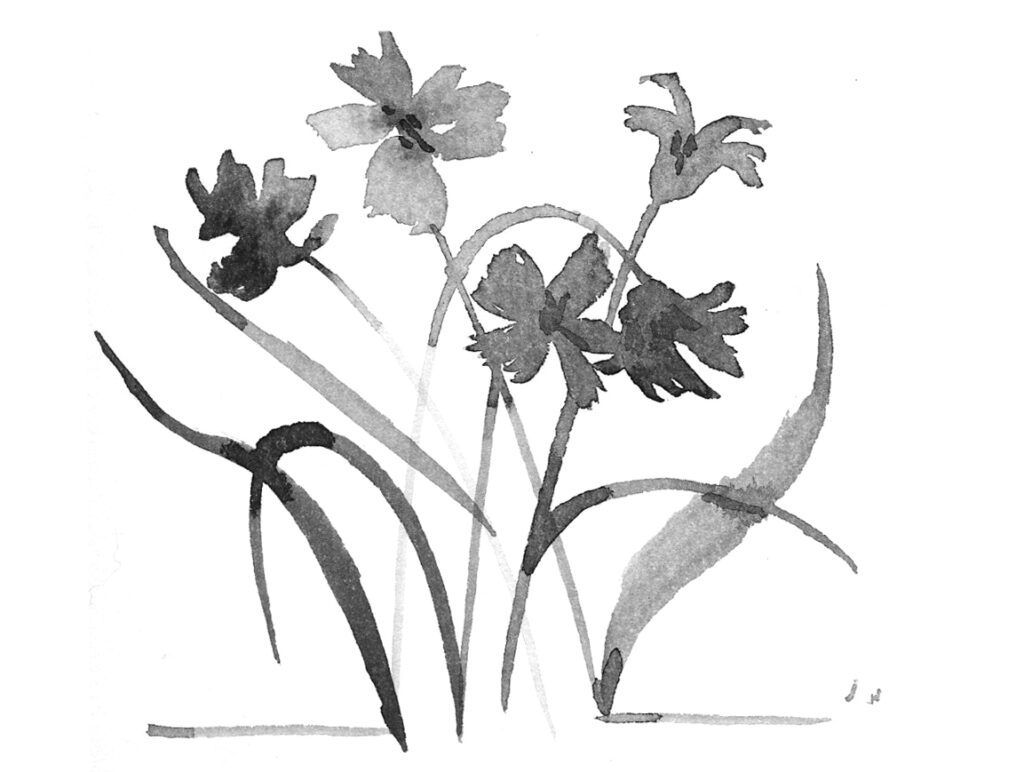
Illustration by Na Kim.
Sometimes, on the campus of the university where I work, a visiting writer will explain to a captive audience how great poems—more often than not his own—get written. These explanations often sound a bit mystical, occasionally even mystifying. So I was amused to read the opening lines of Dobby Gibson’s tongue-in-cheek “Small Craft Talk,” a poem our readers discovered in a box of paper slush, and which you’ll find in our Spring issue:
In some languages the word for dream
is the same as for music
is the kind of thing poets like to say
Before you know it, Gibson’s takedown of writing-program clichés shades into a wonder at how poems can make us feel ourselves, as Wallace Stevens once put it, “more truly and more strange”:
as if you’re hearing the song
of your own mind sung into being
so that you become yourself
by becoming more like another self
When I read a poem like Gibson’s, I usually think, Wow, what a great poem. Then, maybe a little bit enviously, I read it again and try to imagine writing it myself. So it was when I first came across the brutalist intimacies of Tracy Fuad’s “Birth,” or Malachi Black’s poem of cosmic epiphanies “in a burned-out Ford sedan”—both of them also in our Spring issue. How did they do that? I wondered, scratching my head. I felt the same amazement reading Joyce Mansour’s poem, translated by Emilie Moorhouse, which begins “I stole the yellow bird / That lives in the devil’s sex,” and which somehow manages to reach from hell to the heavens in nine lines of verse. Whatever could have possessed this cigar-smoking Egyptian Surrealist to go poking around in the devil’s crotch? Maybe it was a late-night game of exquisite corpse with her friend André Breton that led to her hilariously abbreviated final lines:
As for me, my slumber runs along the rooftops
Mumbling, waving, making violent love,
With cats.
This spring, for readers who’d like to learn more about how poems like these happen, we’ve launched a new online series, Making of a Poem. This week, Michael Bazzett lifts the hood on his portrait of the artist as a (very) young man, “Autobiography of a Poet.” (You might be surprised to learn that when Bazzett hears the poem in his head, it’s spoken by Tony Soprano.) Kyra Wilder, writing about the events that inspired her poem “John Wick Is So Tired,” reveals how that poem very nearly involved a different Hollywood franchise altogether. “I was reading a lot of Ian Fleming that fall,” Wilder writes. “I got pretty obsessed with the fact that he included a recipe for scrambled eggs in a James Bond story … So, it was either going to be ‘John Wick Is So Tired’ or ‘James Bond Could Make You Some Pretty Good Eggs.’”
To accompany the series, we recently published an essay by Matthew Zapruder, “My Royal Quiet Deluxe,” from his forthcoming Story of a Poem: A Memoir, which also illuminates the roundabout, vexing, and yes, occasionally mystical routes that poems take on their way into existence. As a young poet, Zapruder found an old typewriter in his grandparents’ attic and began the hypnotic practice of hammering out whatever poem he was writing over and over again, each version slightly different from the last. “I began not to think about but to hear how necessary each word was or wasn’t: if I skipped something to avoid typing it for the fiftieth or hundredth time, and then when I read it, it sounded fine, I would never look back,” he writes. “I also had a secret, immutable rule. If I ever mistyped a word—horse for house, ward for word, vary for very, or find for fine—I would have to keep it. It was a pact I made with myself, to trust my unconscious, that what seemed to be an error was actually a sign.”
Here’s to oracular typos and scrambled eggs! We hope you’ll keep an eye out for more Making of a Poem pieces on our website, and that you enjoy all the poems—including new work by Nam Le, Uche Nduka, and many others—in our Spring issue.
Srikanth “Chicu” Reddy is the poetry editor of The Paris Review.
from The Paris Review https://ift.tt/zGg0tFB
Comments
Post a Comment